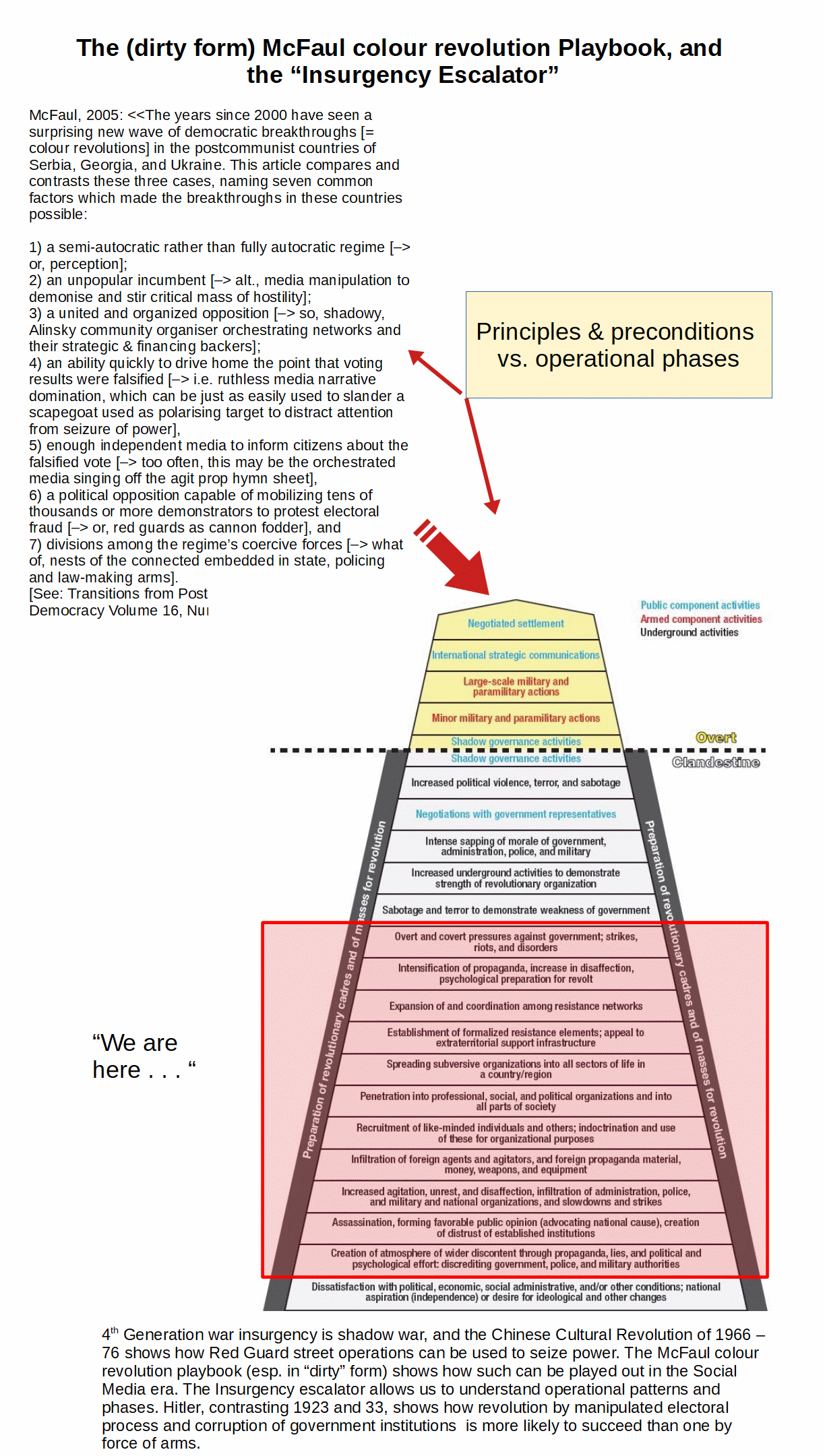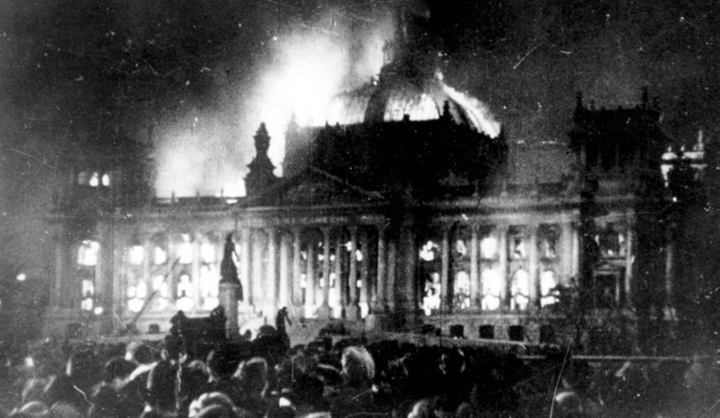Vivid recently reminded us of the painful, bloody lesson of history taught by Hitler’s seizure of power in 1933. I responded, noting:
[I]sn’t it interesting that the Reichstag Fire crisis isn’t a standard part of our general education package. It almost makes one wonder why it is that the story of how the most universally acknowledged unmitigatedly evil dictator seized absolute power through agit prop and lawfare is somehow pushed to the margins of our common fund of knowledge. Not quite a conspiracy of silencing but at least a common evasion of plain duty by those who inform and educate us. Ironically, on a topic where learning this is vital to defending our civilisation, the common thought association fed by dominant narratives will be that appeal to Hitler is fallacious and demonising. Not when it is manifestly relevant and counter-balances a narrative that actually does just such a demonisation . . .
I think it is important enough to actually put up a summary, and I further noted:
This is one time when Wikipedia’s admissions are at minimum relevant and mostly on target food for thought. (I think it is most likely that Hitler and co opportunistically exploited an ill-advised violent protest action by a likely half-mad youth IIRC one week before an election was due, to set an agit prop and lawfare juggernaut loose; that is, I don’t accept the perception that the Nazis set the fire themselves as a false flag operation . . . they were however primed to pounce on and use any convenient incident they could frame through narrative and institutional domination. The consequences were horrific.)
Accordingly, let us learn from that oh so humble source, Wikipedia, as it is forced by a forest of facts to admit:
The Reichstag fire (German: Reichstagsbrand,
listen (help·info)) was an arson attack on the Reichstag building, home of the German parliament in Berlin, on Monday 27 February 1933, precisely four weeks after Adolf Hitler was sworn in as Chancellor of Germany. Hitler’s government stated that Marinus van der Lubbe, a Dutch council communist, was the culprit, and it attributed the fire to communist agitators. A German court decided later that year that Van der Lubbe had acted alone, as he had claimed. The day after the fire, the Reichstag Fire Decree was passed. The Nazi Party used the fire as a pretext to claim that communists were plotting against the German government, which made the fire pivotal in the establishment of Nazi Germany.
The first report of the fire came shortly after 9:00 p.m., when a Berlin fire station received an alarm call.[1] By the time police and firefighters arrived, the lower house ‘Chamber of Deputies’ was engulfed in flames. The police conducted a thorough search inside the building and accused Van der Lubbe. He was arrested, as were four communist leaders soon after. Hitler urged President Paul von Hindenburg to issue an emergency decree to suspend civil liberties and pursue a “ruthless confrontation” with the Communist Party of Germany.[2] After the decree was issued, the government instituted mass arrests of communists, including all of the Communist Party’s parliamentary delegates. With their bitter rival communists gone and their seats empty, the Nazi Party went from having a plurality to a majority, thus enabling Hitler to consolidate his power . . . .
After the November 1932 German federal election, the Nazi Party had a plurality, not a majority; the Communists posted gains.[7] Adolf Hitler was sworn in as Chancellor and head of the coalition government on 30 January 1933.[8] As chancellor, Hitler asked President Paul von Hindenburg to dissolve the Reichstag and call for a new parliamentary election. The date set for the elections was 5 March 1933.[9]
Hitler hoped to abolish democracy in a more or less legal fashion, by passing the Enabling Act. The Enabling Act was a special law that gave the Chancellor the power to pass laws by decree, without the involvement of the Reichstag. These special powers would remain in effect for four years, after which time they were eligible to be renewed. Under the Weimar Constitution, the President could rule by decree in times of emergency using Article 48.[10] During the election campaign, the Nazis alleged that Germany was on the verge of a Communist revolution and that the only way to stop the Communists was to put the Nazis securely in power . . . .
The day after the fire, at Hitler’s request, President Hindenburg signed the Reichstag Fire Decree into law by using Article 48 of the Weimar Constitution. The Reichstag Fire Decree suspended most civil liberties in Germany, including habeas corpus, freedom of expression, freedom of the press, the right of free association and public assembly, and the secrecy of the post and telephone.[18] These rights were not reinstated during Nazi reign. The decree was used by the Nazis to ban publications not considered “friendly” to the Nazi cause. Despite the fact that Marinus van der Lubbe claimed to have acted alone in the Reichstag fire, Hitler, after having obtained his emergency powers, announced that it was the start of a Communist plot to take over Germany. Nazi Party newspapers then published this fabricated “news”.[18] This sent the German population into a panic and isolated the Communists further among the civilians; additionally, thousands of Communists were imprisoned in the days following the fire (including leaders of the Communist Party of Germany) on the charge that the Party was preparing to stage a putsch. Speaking to Rudolph Diels about Communists during the Reichstag fire, Hitler said “These sub-humans do not understand how the people stand at our side. In their mouse-holes, out of which they now want to come, of course they hear nothing of the cheering of the masses.”[19] With Communist electoral participation also suppressed (the Communists previously polled 17% of the vote), the Nazis were able to increase their share of the vote in the 5 March 1933 Reichstag elections from 33% to 44%.[20] This gave the Nazis and their allies, the German National People’s Party (who won 8% of the vote), a majority of 52% in the Reichstag.[20]While the Nazis emerged with a majority, they fell short of their goal, which was to win 50–55% of the vote that year.[20] The Nazis thought that this would make it difficult to achieve their next goal, passage of the Enabling Act giving Hitler the right to rule by decree, which required a two-thirds majority.[20] However, several important factors weighed in the Nazis’ favour, mainly the continued suppression of the Communist Party and the Nazis’ ability to capitalize on national security concerns. Moreover, some deputies of the Social Democratic Party (the only party that would vote against the Enabling Act) were prevented from taking their seats in the Reichstag, due to arrests and intimidation by the Nazi SA. As a result, the Social Democratic Party would be under-represented in the final vote tally. The Enabling Act passed easily on 23 March 1933, with the support of the right-wing German National People’s Party, the Centre Party, and several fragmented middle-class parties. The measure went into force on 24 March, effectively making Hitler dictator of Germany.[21]
The Kroll Opera House, sitting across the Königsplatz from the burned-out Reichstag building, functioned as the Reichstag’s venue for the remaining 12 years of the Third Reich’s existence.[22]
We could say to the latter, an appropriate venue.
Many sobering lessons lurk here, starting with, beware of being trapped between the devil and the deep blue sea. One may be trapped into a false dilemma, especially if one is not thinking straight due to how one is being manipulated by dirty big money and its bought and paid for spokesmen (who will of course have impeccable credentials). Frankly, the historical microcosm for such is Acts 27, taking the text there simply as a slice of literature, here, history, from the classical world.
In that context, I beg us to understand that the Left-Centre-Right [LCR] political spectrum model that dominates popular and even academic thought is deeply flawed, lending itself to manipulation of the perceived centre of safety:
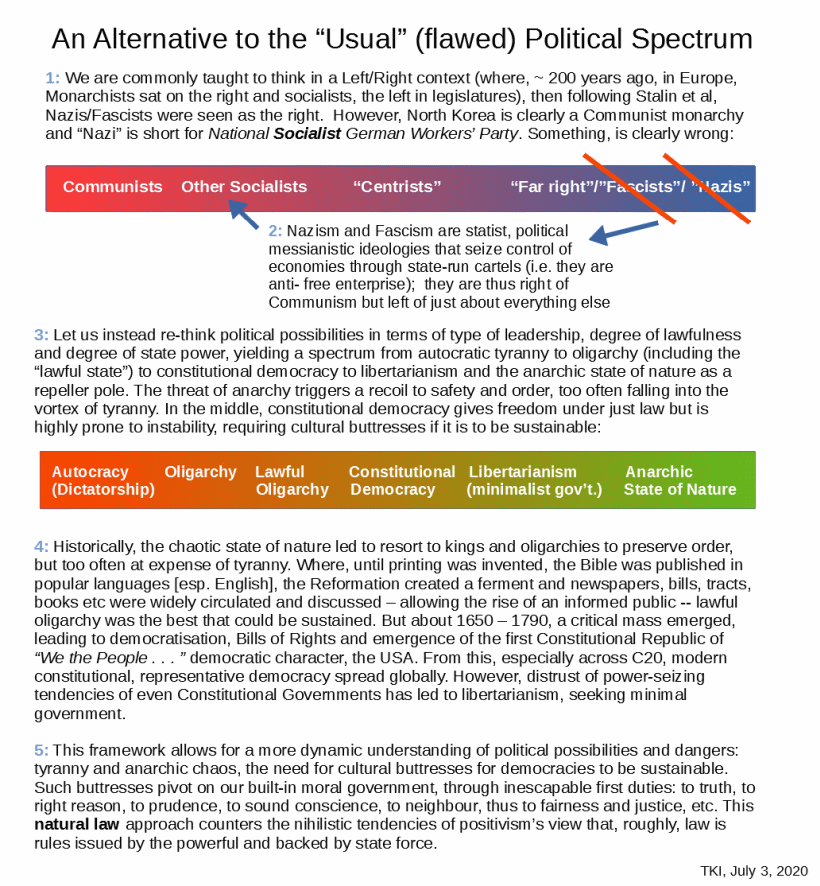
So, instead, let us learn the lesson of the dirty Overton Window game:
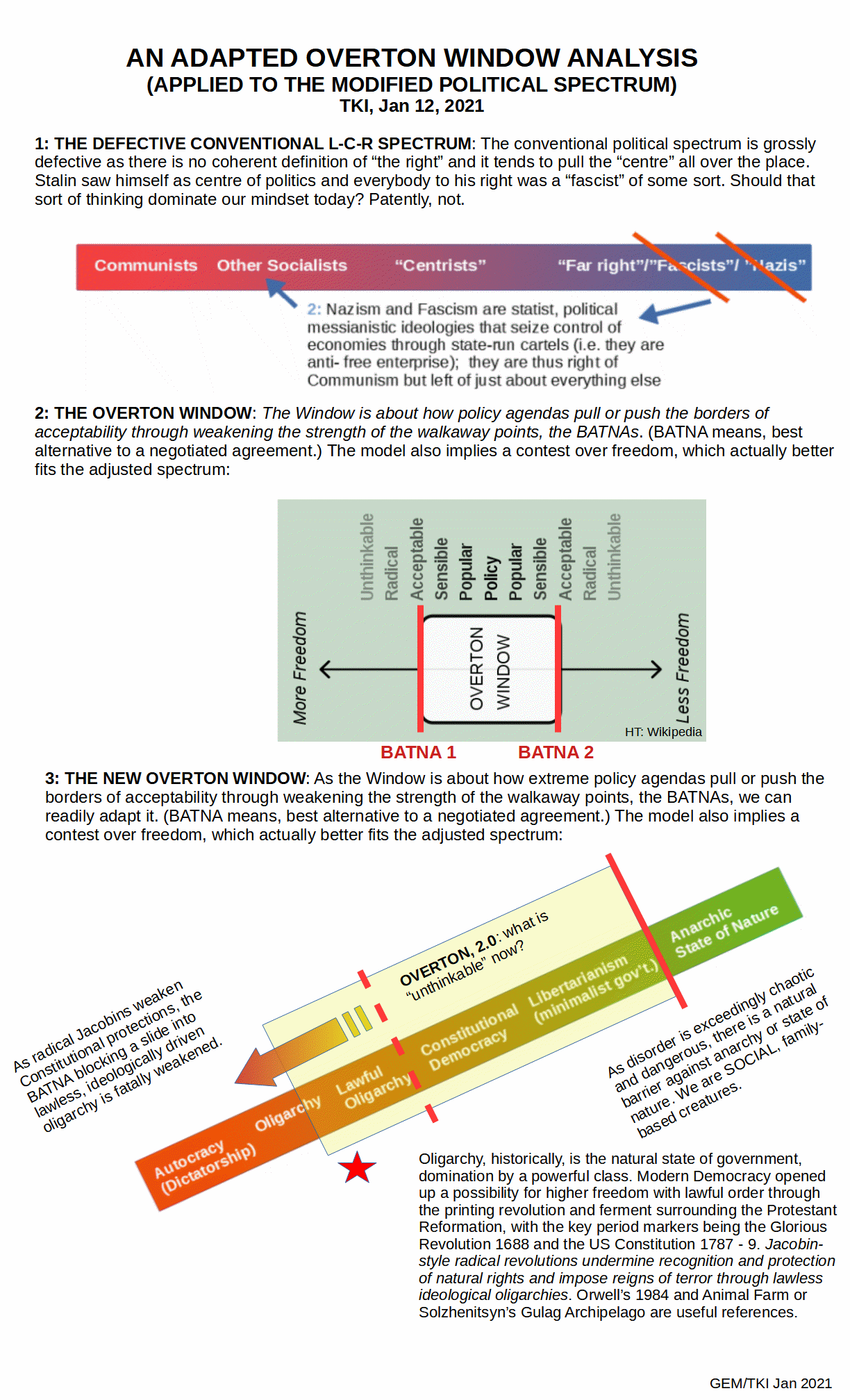
The key thing to recall, is that given the sad history of Athenian democracy and the Peloponnesian war, as well as Ac 27 and much more recent history, democracies are inherently unstable though they also provide for otherwise unprecedented freedom with a good measure of protective order.
For such to happen, there must be stabilising cultural buttresses that lie beyond the rough and tumble of dirty, manipulative politics [thus, the inherent danger of totalising materialistic and/or radically secularist ideologies that are amoral and/or invite nihilism], and which provide a framework of moral guidance tied to core, built-in human characteristics of being morally governed. That, in turn, is why modern constitutional democracy emerged in the matrix of what was then self-consciously Christendom, as we can see reflected in Locke’s key remarks in his second essay on civil government:
[2nd Treatise on Civil Gov’t, Ch 2 sec. 5:] . . . if I cannot but wish to receive good, even as much at every man’s hands, as any man can wish unto his own soul, how should I look to have any part of my desire herein satisfied, unless myself be careful to satisfy the like desire which is undoubtedly in other men . . . my desire, therefore, to be loved of my equals in Nature, as much as possible may be, imposeth upon me a natural duty of bearing to themward fully the like affection. From which relation of equality between ourselves and them that are as ourselves, what several rules and canons natural reason hath drawn for direction of life no man is ignorant . . . [This directly echoes St. Paul in Rom 2: “14 For when Gentiles, who do not have the law, by nature do what the law requires, they are a law to themselves, even though they do not have the law. 15 They show that the work of the law is written on their hearts, while their conscience also bears witness, and their conflicting thoughts accuse or even excuse them . . . “ and 13: “9 For the commandments, “You shall not commit adultery, You shall not murder, You shall not steal, You shall not covet,” and any other commandment, are summed up in this word: “You shall love your neighbor as yourself.” 10 Love does no wrong to a neighbor; therefore love is the fulfilling of the law . . . “ Hooker then continues, citing Aristotle in The Nicomachean Ethics, Bk 8:] as namely, That because we would take no harm, we must therefore do none; That since we would not be in any thing extremely dealt with, we must ourselves avoid all extremity in our dealings; That from all violence and wrong we are utterly to abstain, with such-like . . . ] [Eccl. Polity ,preface, Bk I, “ch.” 8, p.80, cf. here. Emphasis added.] [Augmented citation, Locke, Second Treatise on Civil Government, Ch 2 Sect. 5. ]
Hence, too, the power of Plato’s warning in The Laws, Book X:
Ath[enian Stranger, in The Laws, Bk X 2,360 ya]. . . . [The avant garde philosophers and poets, c. 360 BC] say that fire and water, and earth and air [i.e the classical “material” elements of the cosmos — the natural order], all exist by nature and chance, and none of them by art . . . [such that] all that is in the heaven, as well as animals and all plants, and all the seasons come from these elements, not by the action of mind, as they say, or of any God, or from art, but as I was saying, by nature and chance only [ –> that is, evolutionary materialism is ancient and would trace all things to blind chance and mechanical necessity] . . . . [Thus, they hold] that the principles of justice have no existence at all in nature, but that mankind are always disputing about them and altering them; and that the alterations which are made by art and by law have no basis in nature, but are of authority for the moment and at the time at which they are made.-
[ –> Relativism, too, is not new; complete with its radical amorality rooted in a worldview that has no foundational IS that can ground OUGHT, leading to an effectively arbitrary foundation only for morality, ethics, law and government: accident of personal preference, the ebbs and flows of power politics, accidents of history and and the shifting sands of manipulated community opinion driven by “winds and waves of doctrine and the cunning craftiness of men in their deceitful scheming . . . ” cf a video on Plato’s parable of the cave; from the perspective of pondering who set up the manipulative shadow-shows, why.]
These, my friends, are the sayings of wise men, poets and prose writers, which find a way into the minds of youth. They are told by them that the highest right is might,
[ –> Evolutionary materialism — having no IS that can properly ground OUGHT — leads to the promotion of amorality on which the only basis for “OUGHT” is seen to be might (and manipulation: might in “spin”), opening the door to cynicism, hyperskepticism and nihilism . . . ]
and in this way the young fall into impieties, under the idea that the Gods are not such as the law bids them imagine; and hence arise factions [ –> Evolutionary materialism-motivated amorality “naturally” leads to continual contentions and power struggles influenced by that amorality at the hands of ruthless power hungry nihilistic agendas], these philosophers inviting them to lead a true life according to nature, that is,to live in real dominion over others [ –> such amoral and/or nihilistic factions, if they gain power, “naturally” tend towards ruthless abuse and arbitrariness . . . they have not learned the habits nor accepted the principles of mutual respect, justice, fairness and keeping the civil peace of justice, so they will want to deceive, manipulate and crush — as the consistent history of radical revolutions over the past 250 years so plainly shows again and again], and not in legal subjection to them [–> nihilistic will to power not the spirit of justice and lawfulness].
Hitler and co, also, Lenin, Stalin, Mao and co, have underscored the force of this over the past century. If we are instead to find a road of sound reformation, we would be well advised to look elsewhere. Wiberforce, for example, or Knibb, or Booth.
But then, that is always a challenge, one compounded enormously in a highly ideologised, deeply polarised increasingly radically secularist age. Such does not bode well, but we need to at least be aware before the needless storm. END
F/N, U/D Aug 8: Please please please falsify this message . . . if true this is beyond ridiculous:
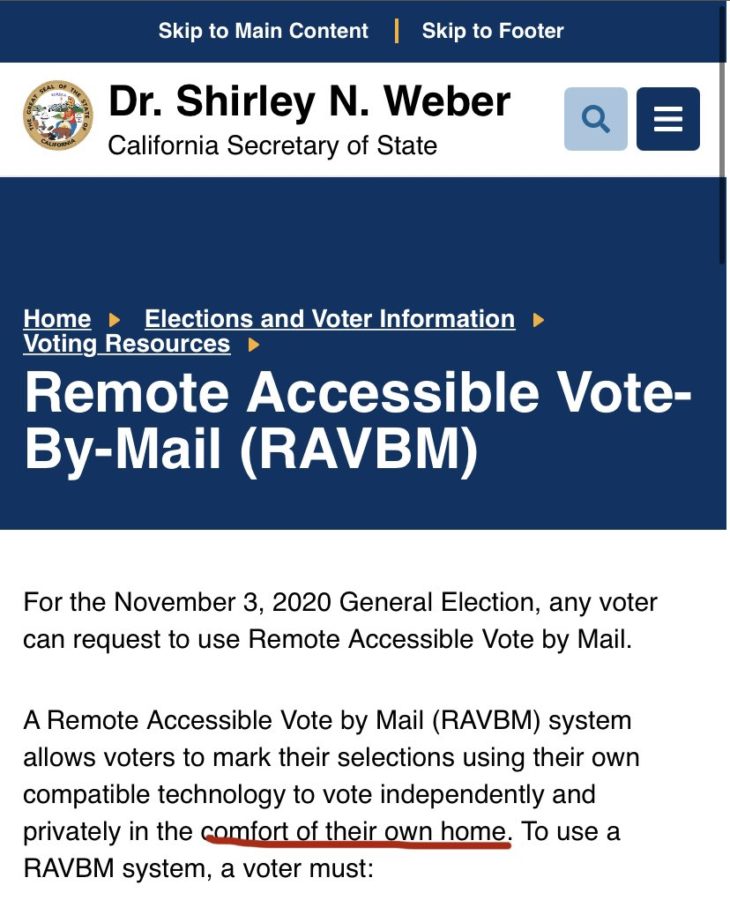
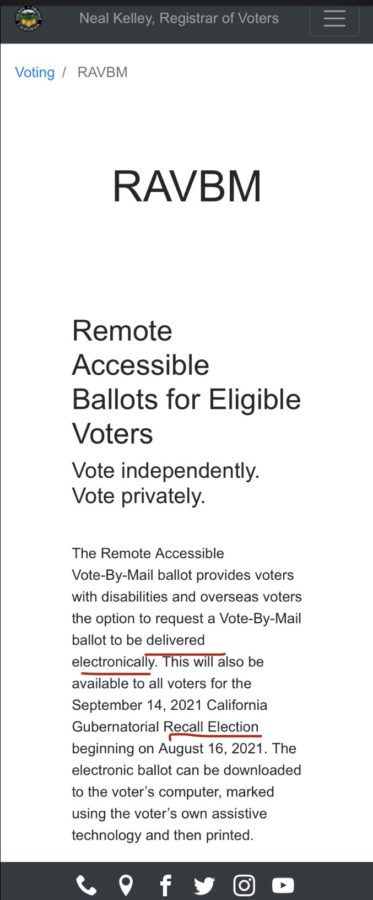
U/D, 2:30 pm, Status, essentially confirmed. It is clear that there is unwillingness to recognise how abuse-prone such a system is.
F/N2: The hate behind the attack on Christians gathering in families for prayer is blatant:
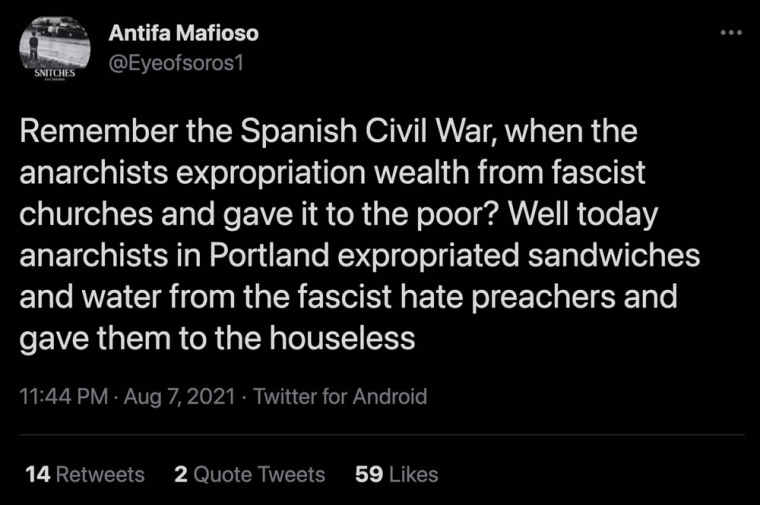
Particularly note the turnabout projection of hate, labelling by invidious association and assumption that the stigmatised scapegoats — this includes families with children forfeit basic rights. This, is red guard rioting.
F/N3: Interview with Andy Ngo on Antifa
F/N4, Aug 11, a reminder on the McFaul Colour Revolution framework and the SOCOM insurgency escalator. First, the US State Dept report and Congressional Archive on abuse of mail-in voting in Ukraine, 2004 — I extensively highlighted this last year:
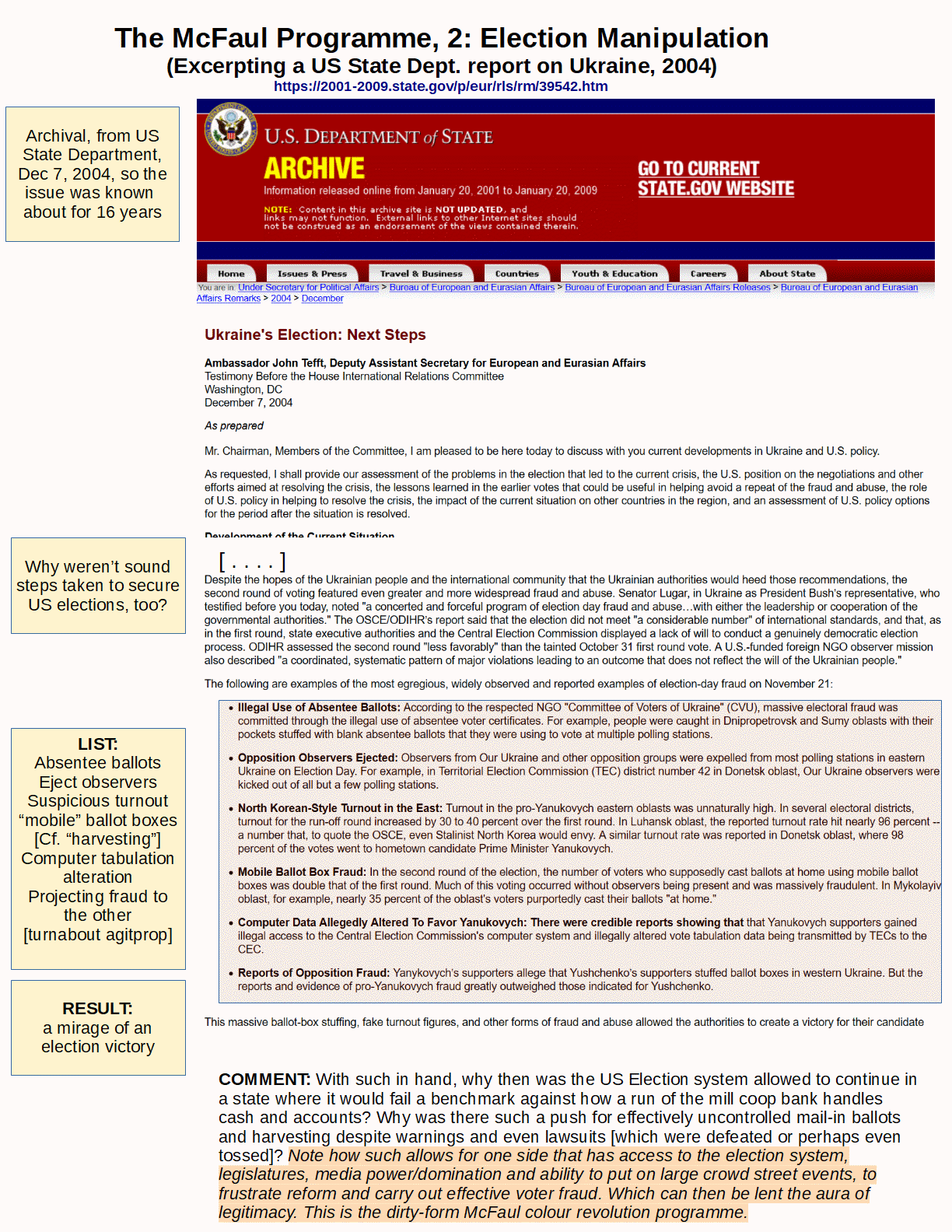
Next, the framework:
